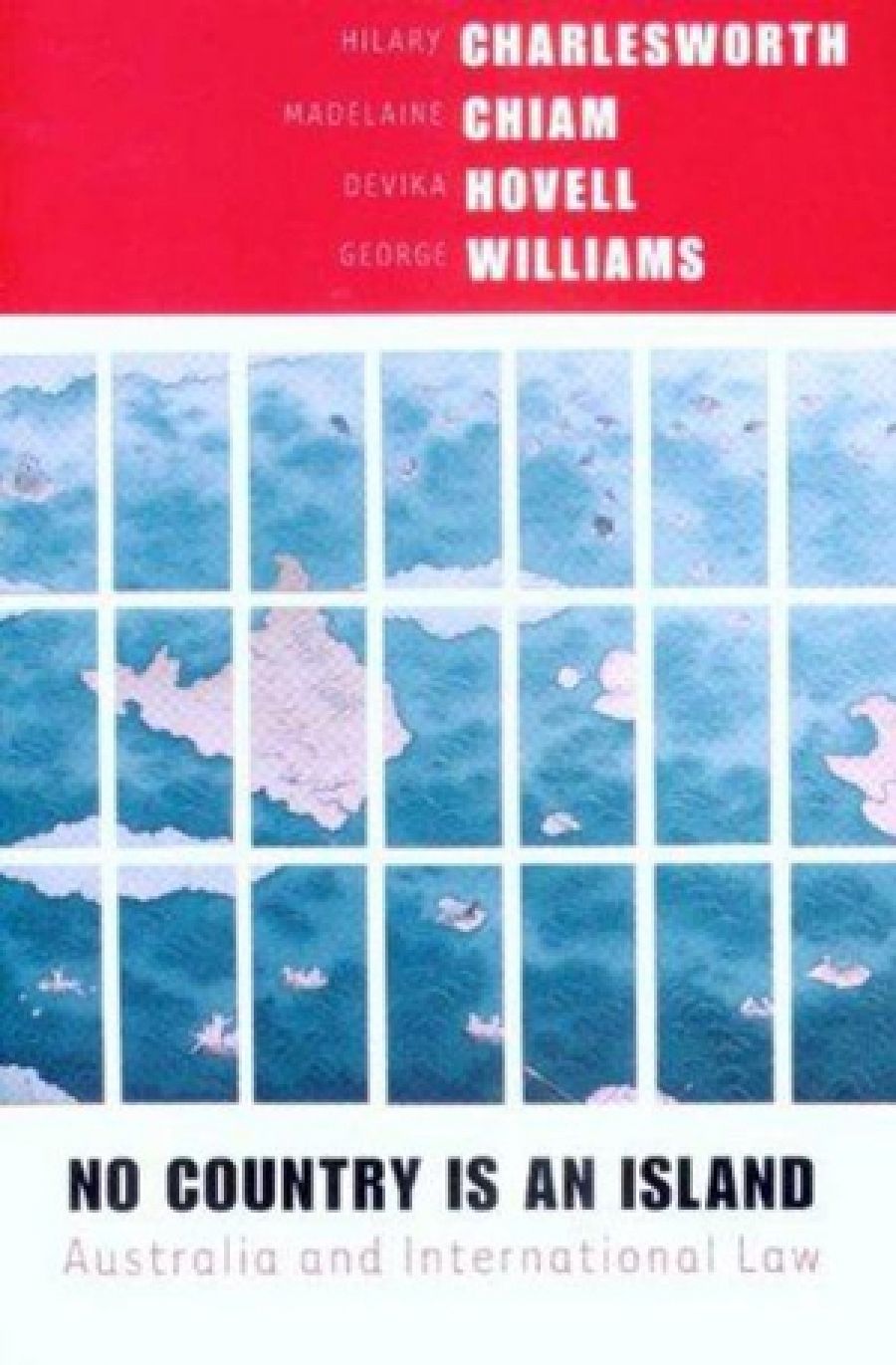
- Free Article: No
- Contents Category: Law
- Review Article: Yes
- Online Only: No
- Custom Highlight Text:
Alexander Downer, when asked on the ABC in February 2003 about the legality of military measures against Iraq, was keen to emphasise Australia’s fidelity to international law: ‘We’ve reached a point where you either take international law seriously and ensure that Iraq does comply with international law or else you abandon the whole concept, at least in this case, of trying to enforce international law.’ But only a month after these comments, the federal government demonstrated its commitment to ‘enforcing’ international law by participating in an invasion characterised as illegal by the preponderance of states and international lawyers.
- Book 1 Title: No Country is an Island
- Book 1 Subtitle: Australia and international law
- Book 1 Biblio: UNSW Press, $34.95 pb, 175 pp
Although its subtitle is ‘Australia and International Law’, the book is not an historical account of Australia’s engagement with international law; instead, it concentrates on Australian interactions with international law since the Coalition government came to power. This would seem an appropriate focus because, to many observers, the current federal government appears determined to retreat from many international rules, standards and institutions accepted as uncontroversial by other industrialised countries. But the authors suggest that both sides of politics have distorted the impact of international law in Australian society, selectively discarding or adopting it depending on the policy to be advanced.
One of the virtues of the book is its brisk account of the way that international law operates in the domestic arena. The authors clearly explain the two main sources of inter-national law: treaty and custom. The formation of customary international law is an enigmatic process: it consists of the presence of dense and widespread state activity in a particular area, coupled with recognition by the participating states that they are acting out of a sense of legal obligation. Treaties are acceded to by the executive branch of government, not the parliament; but as treaties are not automatically incorporated into Australian law, the obligations contained in them must also be implemented by domestic legislation. The authors also explain how Australia’s federal structure complicates the implementation of international law. Because the executive arm has the exclusive competence to enter into or withdraw from treaties, there has been much discussion about whether the lack of legislative oversight creates a ‘democratic deficit’ in the treaty-making process in Australia. This led to the establishment in 1996 of various mechanisms designed to promote greater accountability.
The establishment of the Joint Standing Committee on Treaties (JSCOT) was the most significant reform. JSCOT has considerable power, through submissions and public hearings, to scrutinise and review each treaty into which the executive government proposes to enter. This sounds admirable in theory, but while occasionally critical of government transparency and conduct, JSCOT generally reaches conclusions in line with government policy and has failed to facilitate greater parliamentary involvement.
A chapter is devoted to Australia’s curious relationship to human rights. While traditionally a strong supporter of global human rights standards and institutions, governments have responded harshly to criticisms of Australia’s own human rights compliance. The authors quote Downer, responding to the UN Committee on the Elimination of Racial Discrimination: ‘[i]f a UN Committee wants to play domestic politics here in Australia, then it will end up with a bloody nose.’ Challenges such as these attracted quite a bit of attention, and in recent times the federal government has adopted a policy of silence when its compliance with human rights standards is criticised by UN bodies. To its everlasting discredit, it maintains a similar policy of silence regarding the flagrant breaches of the human rights of one of its citizens, David Hicks, who continues to languish in Guantanamo Bay.
Early in the book, the authors lament the failure of Australian politicians to ‘come to grips with the policy challenges posed by globalisation and the ongoing development of international law’. This seems too sweeping. In some areas, such as the environment, Australia has responded sluggishly. But in other fields of international law, as the detailed chapter on trade demonstrates, Australia has been an active and sustained participant in the globalised economy.
The issue seems much simpler than a failure to understand globalisation. Depending on the issue, marshalling the authority of international law can be a way of adding moral backing to political argument, or it can be characterised as a disruption breaking the crust of national sovereignty. As the various examples demonstrate, while rhetoric about threats to sovereignty is rarely voiced when economic incentives are at stake (as was the case during the negotiation of the Australia–US Free Trade Agreement), international human rights standards and reporting, and the use of international law by Australian judges, are repeatedly characterised as attempts to usurp the democratic process. The authors suggest that ‘[b]uilding parliament into the decision to take on new obligations to a greater extent in the first place may go some way to ensuring the international obligations are taken more seriously’. This is a noble hope; but even with more sophisticated understanding of international law and its development, it is likely that concepts such as the ‘national interest’ and ‘sovereignty’ will continue to be rigged up to suit the political winds.


Comments powered by CComment